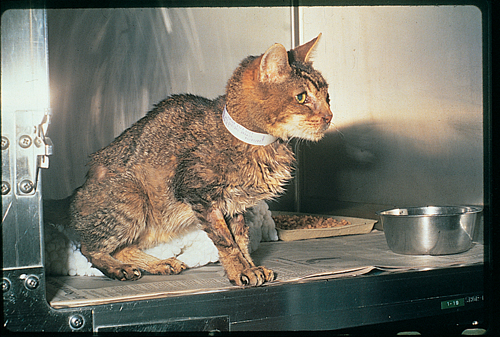Difference between revisions of "Small Animal Emergency and Critical Care Medicine Q&A 12"
Ggaitskell (talk | contribs) |
|||
| Line 11: | Line 11: | ||
|a1= | |a1= | ||
Haemobartonella felis is a common cause of anemia in FeLV positive cats. | Haemobartonella felis is a common cause of anemia in FeLV positive cats. | ||
| − | |l1= | + | |l1=Feline Infectious Anaemia |
|q2=Would you expect the anemia to be regenerative or non-regenerative? | |q2=Would you expect the anemia to be regenerative or non-regenerative? | ||
|a2= | |a2= | ||
Typically, FeLV is associated with macrocytosis; however, cats with H. felis infection may be normocytic (MVC – 60–70 fl) and non-regenerative. | Typically, FeLV is associated with macrocytosis; however, cats with H. felis infection may be normocytic (MVC – 60–70 fl) and non-regenerative. | ||
| − | |l2= | + | |l2=Feline Infectious Anaemia |
|q3=Describe your protocol for transfusing this cat. | |q3=Describe your protocol for transfusing this cat. | ||
|a3= | |a3= | ||
| Line 29: | Line 29: | ||
Blood should always be administered through an appropriate filter and administration set designed to retain blood clots and other debris. | Blood should always be administered through an appropriate filter and administration set designed to retain blood clots and other debris. | ||
| − | |l3= | + | |l3=Administering a Blood Transfusion |
| − | |||
</FlashCard> | </FlashCard> | ||
Revision as of 11:14, 22 August 2011
This two-year-old, FeLV-positive, entire male cat presented for anorexia and lethargy. Physical examination revealed: pale mucous membranes; RR – 80 bpm; HR – 240 bpm. PCV – 70%; TS – 8.0 g/dl.
| Question | Answer | Article | |
| Which infectious disease would be likely to be causing the anemia in this FeLV–positive cat? | Haemobartonella felis is a common cause of anemia in FeLV positive cats. |
Link to Article | |
| Would you expect the anemia to be regenerative or non-regenerative? | Typically, FeLV is associated with macrocytosis; however, cats with H. felis infection may be normocytic (MVC – 60–70 fl) and non-regenerative. |
Link to Article | |
| Describe your protocol for transfusing this cat. | Generally, whole blood is administered to cats requiring RBC transfusion. Whole blood can be withdrawn from a donor cat by sedating the donor with ketamine (2–4 mg/kg i/v). Typically, approximately 50–60 ml of blood can be withdrawn from the donor cat into a syringe containing 9 ml of acid citrate dextrose (7 ml of blood/ml of acid citrate dextrose). The volume and rate of blood administered varies with the patient’s clinical signs and laboratory data. In general, 2 ml/kg of whole blood will increase the patient’s PCV by 1%. The transfusion rate for whole blood should be 5 mg/kg during a 4-hour period or, if the patient is hypovolemic, 5 ml/kg/hour. The first 10 ml should be given slowly over a 15 minute period to observe for adverse reactions. Blood should always be administered through an appropriate filter and administration set designed to retain blood clots and other debris. |
Link to Article | |
